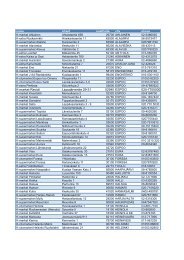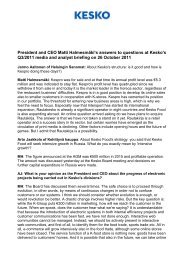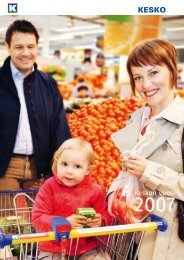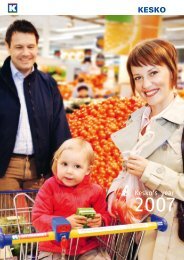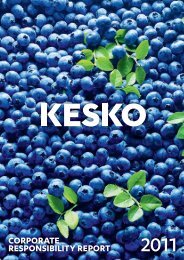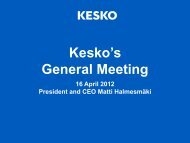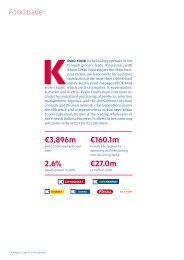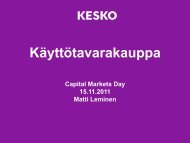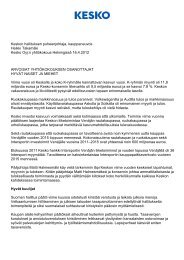Kesko's Annual Report 2009
Kesko's Annual Report 2009
Kesko's Annual Report 2009
Create successful ePaper yourself
Turn your PDF publications into a flip-book with our unique Google optimized e-Paper software.
Significant risks and uncertainties<br />
The general economic development continues to involve significant<br />
uncertainties. Developments in the employment situation,<br />
tax increases resulting from the debt burden of the public sector,<br />
and consumers' confidence in the future have an essential<br />
impact on consumers' purchasing power, consumer demand and<br />
businesses' investment readiness. The biggest uncertainty relates<br />
to the building and home improvement trade, and the car and<br />
machinery trade, as well as the consumer demand trends in<br />
<strong>Kesko's</strong> operating countries, especially in Latvia, Lithuania,<br />
Estonia and Russia.<br />
Kesko aims to achieve growth also through international<br />
expansion in selected business areas. Failures in these projects<br />
may put growth and profitability at risk. On the other hand,<br />
business and stores site acquisitions may be easier to complete<br />
and with better terms. Expansion and operations in Russia<br />
involve both opportunities and risks. The unpredictability of officials<br />
and sudden changes in the interpretation and application<br />
of laws may complicate operating activities or delay expansion in<br />
Russia.<br />
Changes in consumer behaviour, technological developments<br />
and an increasing supply of electronic services are significantly<br />
changing the operating systems of trade. <strong>Kesko's</strong> challenge is to<br />
combine the possibilities of online trading, electronic customer<br />
communication and the retailer business model into an efficient<br />
system.<br />
The automation of financial administration routines may be<br />
delayed by suppliers' and retailers' technical facilities and abilities<br />
to adopt new operating systems. Kesko is carrying out several<br />
significant information system projects. There is a risk that the<br />
expected benefits are delayed or that the project costs are<br />
exceeded.<br />
The trading sector is characterised by increasingly complicated<br />
and long supply chains and a dependency on information systems,<br />
telecommunications and external service providers. Disturbances<br />
in the supply chain can cause major losses in sales and<br />
profit.<br />
Failure in the protection of personal information and card<br />
payments could cause losses, claims for damages and the<br />
degrading of reputation.<br />
Shrinkage causes significant financial losses for the retail<br />
trade. Shrinkage results, for example, from spoiled or damaged<br />
goods, theft or other malpractice, and unsuccessful purchasing.<br />
Recession entails a growing risk of financial malpractice.<br />
In business divisions that are strongly dependent on individual<br />
principals and suppliers, such as the car and machinery<br />
trade, ownership arrangements, changes in a principal's or supplier's<br />
strategy concerning the product selection, pricing and distribution<br />
channel solutions can mean a reduction in competitiveness<br />
or sales or loss of business.<br />
Considerable amounts of capital or lease liabilities are tied up<br />
in store properties for years. As a result of the recession or<br />
changes in local competitive situations, the operations in a store<br />
site can run risk of becoming unprofitable and the operation<br />
ends while non-current liabilities remain.<br />
A failure in product control or in the quality assurance of the<br />
supply chain may result in financial losses, the loss of customer<br />
confidence or, in the worst case, a health hazard.<br />
Compliance with legislation, agreements and <strong>Kesko's</strong> responsibility<br />
guidelines or ethical principles is an important basic<br />
Kesko financial statements <strong>2009</strong><br />
value. Non-compliance may result in fines, compensation for<br />
damages and other financial losses, and a loss of confidence or<br />
reputation.<br />
Further information about the risks, uncertainties and management<br />
responses relating to <strong>Kesko's</strong> operating activities, and<br />
about <strong>Kesko's</strong> risk management system and principles is available<br />
in note 42 to the financial statements and on the company's<br />
website at www.kesko.fi.<br />
Other risks and uncertainties relating to profit performance<br />
are described in the Group’s future outlook.<br />
77<br />
Future outlook<br />
Estimates of the future outlook for the Kesko Group's net sales<br />
and operating profit excluding non-recurring items are given for<br />
the 12 months following the reporting period (1/2010–12/2010)<br />
in comparison with the 12 months preceding the reporting<br />
period (1/<strong>2009</strong>–12/<strong>2009</strong>). The performance of the Group's operating<br />
activities is affected by the economic outlook in its different<br />
market areas and especially by the growth rate of private consumption.<br />
Substantial uncertainties are related to the economic<br />
outlook and developments in the real economy in the near<br />
future. In Finland, the unemployment rate is expected to rise<br />
further, which is why private consumer demand is not expected<br />
to return to growth during the next twelve months.<br />
The steady development of the grocery trade is expected to<br />
continue, although grocery prices are expected to turn down. The<br />
market situation is expected to remain difficult in the building<br />
sector and in the car and machinery trade.<br />
Making any statement about the Group's future outlook continues<br />
to be impacted by the economic outlook and the increasing<br />
unemployment. In 2010, the Kesko Group's net sales and<br />
operating profit excluding non-recurring items from continuing<br />
operations are expected to match the level of <strong>2009</strong>. The Group's<br />
liquidity and solvency are expected to remain excellent.<br />
Proposal for profit distribution<br />
The parent's distributable profits are €1,051,861,023.07, of<br />
which the profit for the period is €138,776,973.11.<br />
The Board of Directors proposes to the <strong>Annual</strong> General Meeting to<br />
be held on 29 March 2010 that the distributable profits be used<br />
as follows:<br />
€0.90 per share, or a total of €88,547,166.90, be distributed as<br />
dividends.<br />
€1,300,000.00 are reserved for charitable donations at the<br />
discretion of the Board of Directors.<br />
€962,013,856.17 are carried forward in equity.<br />
<strong>Annual</strong> General Meeting<br />
The Board of Directors decided to convene the <strong>Annual</strong> General<br />
Meeting at the Helsinki Fair Centre on 29 March 2010 at 13.00.<br />
Kesko Corporation will publish a notice of the <strong>Annual</strong> General<br />
Meeting at a later date.<br />
<strong>Annual</strong> <strong>Report</strong> <strong>2009</strong> and<br />
Corporate Governance Statement<br />
Kesko will publish the <strong>2009</strong> <strong>Annual</strong> <strong>Report</strong>, which contains the<br />
report by <strong>Kesko's</strong> Board of Directors and the financial statements<br />
for <strong>2009</strong>, and a separate Corporate Governance Statement on<br />
week 9 on its website at www.kesko.fi.



